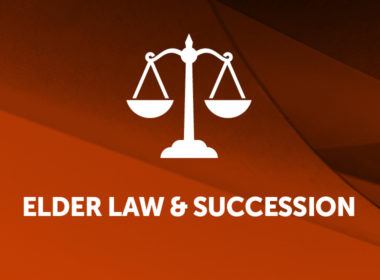Key decisions
- Re Dion Investments Pty Limited [2020] NSWSC 1661
- Torok v Becker [2020] NSWSC 1570
- Greenham v Greenham [2020] VSC 749
- Emery v Coal Mines Insurance Pty Limited (No 1) [2020] NSWSC 1664
- SZH [2020] NSWCATGD 28
Removing a foreign person as a beneficiary of a discretionary trust
In Re Dion Investments Pty Limited [2020] NSWSC 1661 (Sackar J) the Court gave judicial advice on a series of questions arising from the State Revenue Legislation Further Amendment Act 2020 (‘the Act’) (whereby surcharge duty is levied on residential real estate owned by a discretionary trust where a beneficiary could be a foreign person).
First, as a matter of construction of the terms of the trust, the Court decided the trustee of the discretionary trust could not disclaim or surrender the power to appoint income and/or capital to a beneficiary of the trust estate whilst the beneficiary is a ‘foreign person’ as defined by the Act (at [22]–[24]).
Secondly, whilst the trustee would be justified in not exercising its powers to appoint and/or distribute trust property to any beneficiary that is a ‘foreign person’ and who disclaimed their interest, because the class of beneficiary is open and includes ‘issue’, that action would not prevent a foreign person becoming a beneficiary (at [27]).
Thirdly, where the power to revoke any trust is reposed in named persons who are dead, it is a matter of construction of the terms of the trust whether the power is annexed to the office or whether the power attaches to the named individuals only (at [31]). Here it was the latter, so the power ended on the named person’s death.
Fourthly, the evidence indicated that, by reason of the Act, the release or surrender of trusts so that a foreign person is not a beneficiary will reduce the annual land tax charge on the trustee with respect to the residential property held subject to the trustee estate. The Court considered that an order conferring the power of release and/or surrender pursuant to s 81 of the Trustee Act was ‘expedient in the management or administration of the residential property held by the trustee, notwithstanding that the order would adjust or even destroy the rights of some (potential) beneficiaries to the extent that they meet the definition of a ‘foreign person’ (at [41]).
Elder financial abuse
Isolde Becker had two children, Lara and David. By her last will in 2016, she gave $1 million to Lara, $2 million to David and the residue to them equally. Upon her death in 2019, her estate consisted of $2,917 in cash and some personal items. In 2017 she had sold her home for $4.625 million. The proceeds were used to purchase real estate in the name of David and his wife Susan for $1.525 million. David and his company received 94 internet bank payments over 4 years and 4 months from 2015 totalling $1,776,054 from his mother. Isolde did not have a computer. A large number of payments were for expenses which did not relate to Isolde’s activities.
Fiduciary duty: The Court found that David made the transfers. He had a fiduciary duty ‘to keep and (at least when requested) communicate a clear account of the money passing through his account’ (Torok v Becker [2020] NSWSC 1570 (Ward CJ in Eq) at [282]). That obligation enures for the benefit of the deceased’s estate (at [283]). In the absence of a proper accounting, David was ordered to refund to the estate the amount withdrawn from the bank account with the exception of those amounts that were most likely to have been for the benefit of Isolde ($9,531). Erring on the side of the estate, the Court calculated that this was $1,819,573.
Undue influence: There was a relationship of dependency by the deceased upon David. She was elderly, in deteriorating physical health, on medication for pain relief and experiencing increasing difficulties in caring for herself. She reposed trust and confidence in him. This gave rise to a presumption of undue influence. It therefore fell to David to positively justify the retention of the benefit conferred on him (at [295]). To do so he needed to show that the amounts he received ‘were the independent and understood acts of the deceased made when she was in a position to exercise a free judgment based on information as full as was David’ (at [197]). The Court found that the presumption was not rebutted in relation to the proceeds of sale and the bank transfers.
Unconscionable conduct: The Court considered that the deceased was in a position of special disadvantage because she was elderly, suffering physical ailments, and vulnerable and dependent on David for her future accommodation (at [312]). It found that David unconscientiously took advantage of that opportunity.
Orders: The total amount recoverable by the estate was $3,341,785 together with compound interest at the default trustee rate. To the extent that David was ‘unable to reimburse the estate for the full amount so ordered, the shortfall should be treated as an ademption of the legacy provided under the will’ (at [366]).
Removal as executor: David had shown himself unfit to carry out the duties as executor and Lara was appointed administrator of the estate (at [367]).
Construction at date of will not date of death
Ethel Greenham died in 2017 aged 80. By her last will made in 2003 she devised to her son Alan ‘my real estate at Pental Island’. She left the rest of her estate to her daughter, Jennifer. The land abutted the Murray River. A farm and caravan park were conducted on the land and required access to water from the river. At the date of the will, common law riparian rights were appurtenant to the land. By the testator’s death, the water rights existed separately by reason of supervening legislation. The Court in Greenham v Greenham [2020] VSC 749 (Moore J) was called upon to determine whether ‘my real estate’ included the water rights.
The Court noted that the Victorian equivalent of Succession Act 2006 s 30 provided that a will takes effect, with respect to the property disposed of by the will, as if it had been executed immediately before the death of the testator, unless a contrary intention appears in the will. The Court concluded that ‘a necessary implication from the deceased’s expressed intention to devise to Alan the ‘real estate’ on Pental Island was that she intended Alan to receive the common law riparian rights which went with the land’. Notwithstanding that the real estate didn’t include water rights at her death; there was a contrary intention allowing the will to be construed at the deceased’s death (at [88]).
The requirements for an expert’s report
A report from a medical expert is sometimes obtained to assist the practitioner or a court to assess a person’s testamentary or mental capacity. The Court in Emery v Coal Mines Insurance Pty Limited (No 1) [2020] NSWSC 1664 (Bellew J) ruled on the admissibility of a number of medical and other expert reports. The Court referred to the relevant provisions of the Evidence Act 1995 (NSW), ss 76, 79, 80 and 135. It commented on the form the report should take (at [10]). It listed the five governing principles for admissibility (at [8]). First, the expert evidence must be relevant, which requires identification of the fact in issue that the party tendering the evidence asserts that the opinion proves, or assists in proving. Secondly, the expert must have specialised knowledge based on that person’s training, study or experience. Thirdly, the evidence must be wholly or substantially based on that knowledge. Fourthly, the expert must explain how the field of specialised knowledge in which he or she is an expert by reason of training, study or experience, and on which his or her opinion is wholly or substantially based, applies to the facts assumed or observed, so as to produce the opinion propounded. (In that case, the tender of a number of reports was rejected because of the failure of the expert to explain how the opinion was reached.) Fifthly, the factual basis of the opinion must be made clear, although it is not necessary for that basis to be established or proved for the report to be admissible.
Coded keypad access can amount to false imprisonment in residential aged care facility
In SZH [2020] NSWCATGD 28, the Tribunal considered the appointment of a guardian for a resident with severe cognitive impairment living in a secured residential aged care facility. The resident, SZH, is 65 years of age requires high-level care due to the effects of alcohol related brain injury and dementia that has resulted in severe cognitive impairment. He is restricted in important major life activities to such an extent that he requires supervision or social habilitation. The front door of the facility is locked by a coded keypad. Due to his cognitive impairment, SZH is not able to remember the passcode and would not know how to use the keypad even if he were given the passcode. He is generally reclusive. Because SZH is unable to unlock the front door and gate of the facility, he is not able to leave the facility unless he is accompanied. The aged care facility made an application seeking the appointment of a guardian about this aspect of the care provided to SZH, prompted by its understanding of the requirements set out under Pt 4A of the Quality of Care Principles 2014 (Cth) made pursuant to the Aged Care Act 1997.
The Tribunal concluded that these conditions imposed a total restraint on SZH’s freedom of movement as he is unable to unlock the front door and gate of the facility (at [135]). It reached that conclusion even though SZH was unaware of being restrained and has never asked to leave the facility or attempted to leave the facility of his own accord. ‘He is restrained even though physical force is not required to prevent him from doing so due to his submission or passive acquiescence’ (at [137]). The Tribunal reached that conclusion even though it accepted that the restraints placed on SZH’s freedom of movement were so placed with the intention of ensuring his safety, as well as the safety of other residents. It was satisfied that SZH was unable to give his own informed consent to the restraint and that it is not otherwise authorised, justified or excused by statute or common law.
In deciding whether or not to provide the guardian with decision making authority about this issue, the Tribunal considered the principles set out in s 4 of the Guardianship Act 1987 (NSW) and concluded that it would promote SZH’s welfare and interests for a guardian to be appointed to decide upon the circumstances of his restraint. ‘Due to the impact of SZH’s cognitive impairment, he is unable to give or withhold consent to the circumstances in which he is living and it is appropriate and in his interests for a guardian to have the authority to do so in his stead’ (at [9]). It imposed a condition that the guardian may consent to the use of the physical restraint permitted under this order in relation to SZH only if SZH is regularly monitored for signs of distress or harm and the use of the restraint is regularly monitored and reviewed.

Darryl Browne is the Principal at BROWNE.Linkenbagh Legal Services, and Chair of the Law Society Elder Law, Capacity and Succession Committee.


